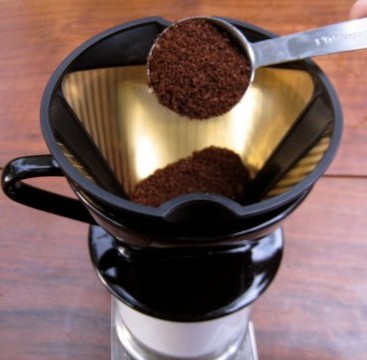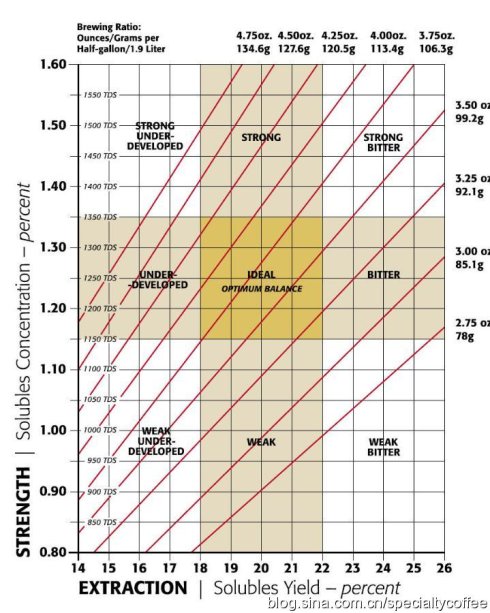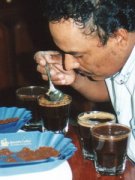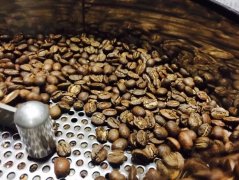The brewing skills of fine coffee the ratio of coffee to water

(source: google)
Standard brewing ratio (Standard Brewing Ratio)
Coffee cup count
The amount of coffee used COFFEE TO BE USED
Water consumption WATER TO BE USED
Cups of Coffee
By weight
Meter by measuring tool
BY WEIGHT
BY MEASURE
Ounce Ounces
Gram Grams
Teaspoon Tea
Spoon Table
Cup Cups
Coffee liquid (oz)
Number of cups Cups
Pint Pints
Quart Quarts
One GAL, two gallons, two gallons.
Ml CCs (milliliters)
L Liters
Spoons
Spoons
Fluid
Ounces
1
0.38
11
6
2
January 8th
8
1
January second
January fourth
January 8th
237
0.2
2
0.75
21
12
4
January fourth
16
2
1
January second
January fourth
473
0.5
3
1.13
32
18
6
March 8th
24
3
1 1/2
March fourth
March 8th
710
0.7
4
1.5
43
24
8
January second
32
4
2
1
January second
947
1
5
1.88
53
30
10
May 8th
40
5
2 1/2
1 1/4
May 8th
1183
1.2
6
2.25
64
36
12
March fourth
48
6
3
1 1/2
March fourth
1420
1.4
7
2.63
74
42
14
July 8th
56
7
3 1/2
1 3/4
July 8th
1656
1.7
8
3
85
48
16
1
64
8
4
2
1
1893
1.9
9
3.38
96
54
18
1 1/8
72
9
4 1/2
2 1/4
1 1/8
2130
2.1
10
3.75
106
60
20
1 1/4
80
10
5
2 1/2
1 1/4
2366
2.4
11
4.13
117
66
22
1 3/8
88
11
5 1/2
2 3/4
1 3/8
2603
2.6
12
4.5
128
72
24
1 1/2
96
12
6
3
1 1/2
2840
2.8
If you know the amount of coffee powder, multiplied by the coefficient 21.33, you know how many ounces of water you need (0.046875 is the inverse coefficient), multiplied by the coefficient 22.2593, you get how many milliliters of water you need (0.04493 is the inverse coefficient).
For example, if you have 1.2oz coffee powder, multiply it by 21.33g, you will need 25.6oz water; 92.6g coffee powder will need 2061CCs water. The amount of coffee powder required can be obtained by multiplying the inverse coefficient with the known amount of water.
The brewing ratio of enthusiasts Connoisseur's Brewing Ratio
Cups of Coffee
The amount of coffee used COFFEE TO BE USED
Water consumption WATER TO BE USED
BY WEIGHT
BY MEASURE
Ounces
Grams
Tea
Table
Cups
Fluid
Cups
Pints
Quarts
1/2 Gal
CCs
Liters
Spoons
Spoons
Ounces
(milliliters)
1
0.38
10.6
6
2
January 8th
6
March fourth
March 8th
March sixteenth
3/32
177
0.18
2
0.75
21.3
12
4
January fourth
12
1 1/2
March fourth
March 8th
March sixteenth
355
0.35
3
1.13
31.9
18
6
March 8th
18
2 1/4
1 1/8
September sixteenth
9/32
532
0.53
4
1.5
42.5
24
8
January second
24
3
1 1/2
March fourth
March 8th
710
0.71
5
1.88
53.2
30
10
May 8th
30
3 3/4
1 7/8
15/16
15/32
887
0.89
6
2.25
63.8
36
12
March fourth
36
4 1/2
2 1/4
1 1/8
September sixteenth
1065
1.06
7
2.63
74.4
42
14
July 8th
42
5 1/4
2 5/8
1 5/16
21/32
1242
1.24
8
3
85.1
48
16
1
48
6
3
1 1/2
March fourth
1420
1.42
9
3.38
95.7
54
18
1 1/8
54
6 3/4
3 3/8
1 11/16
27/32
1597
1.6
10
3.75
106
60
20
1 1/4
60
7 1/2
3 3/4
1 7/8
15/16
1775
1.77
11
4.13
117
66
22
1 3/8
66
8 1/4
4 1/8
2 1/16
1 1/32
1952
1.95
twelve
4.5
one hundred and twenty eight
seventy-two
twenty-four
1 1/2
seventy-two
nine
4 1/2
2 1/4
1 1/8
2130
2.13
If you know the amount of coffee powder, times the coefficient 16, you know how many ounces of water you need (0.0625 is the inverse coefficient), multiplied by the coefficient 16.6945, you get how many milliliters of water you need (0.04493 is the inverse coefficient).
For example, if you have 1.2oz coffee powder multiplied by 16.0, you need 19.2oz water; 92.6g coffee powder requires 1562CCs (1.56L) water. The amount of coffee powder required can be obtained by multiplying the inverse coefficient with the known amount of water.
Comparing the two tables, it is not difficult to find that the so-called brewing of enthusiasts is just a little higher in concentration and heavier in taste. Simple and simple words: one serving of powder, about 16 parts of water.
The picture below is the coffee brewing rate chart of SCAA, which looks a little confused.

(source: scaa.org)
Source: Blackbearcoffee translation: Huang Wei (Sina Huang Wei boutique coffee)
Important Notice :
前街咖啡 FrontStreet Coffee has moved to new addredd:
FrontStreet Coffee Address: 315,Donghua East Road,GuangZhou
Tel:020 38364473
- Prev

Coffee Cup Test (Cup Testing) Evaluation of Coffee Taste
The essence of fine coffee Specialty Coffee is in the cup test (Cup Testing or Cupping), that is, the evaluation of coffee taste, and the cup test (Cupping) is a very important step. Cup test props: coffee cup test 10 steps: 1. Prepare a little (about 10 grams) freshly roasted and immediately ground coffee in a small cup. two。 Smell it and see its dry fragrance. 3. Pour in about 95 degrees heat.
- Next

Detailed analysis of mineral carbohydrates in coffee beans
Moisture: the water content of coffee beans varies greatly with different processing stages and products. The moisture content of wet coffee beans with film is about 50%, while that of dried raw coffee beans is about 10%-13%. The water content of roasted coffee beans is only less than 5%. The existence of water in coffee beans is the same as other kinds of food and beverages, because it contains a considerable amount of hydration colloid macromolecules.
Related
- Detailed explanation of Jadeite planting Land in Panamanian Jadeite Manor introduction to the grading system of Jadeite competitive bidding, Red bid, Green bid and Rose Summer
- Story of Coffee planting in Brenka region of Costa Rica Stonehenge Manor anaerobic heavy honey treatment of flavor mouth
- What's on the barrel of Blue Mountain Coffee beans?
- Can American coffee also pull flowers? How to use hot American style to pull out a good-looking pattern?
- Can you make a cold extract with coffee beans? What is the right proportion for cold-extracted coffee formula?
- Indonesian PWN Gold Mandrine Coffee Origin Features Flavor How to Chong? Mandolin coffee is American.
- A brief introduction to the flavor characteristics of Brazilian yellow bourbon coffee beans
- What is the effect of different water quality on the flavor of cold-extracted coffee? What kind of water is best for brewing coffee?
- Why do you think of Rose Summer whenever you mention Panamanian coffee?
- Introduction to the characteristics of authentic blue mountain coffee bean producing areas? What is the CIB Coffee Authority in Jamaica?

